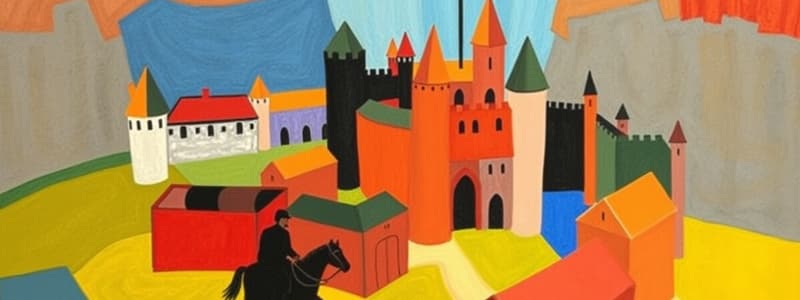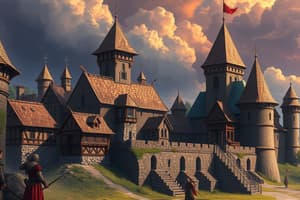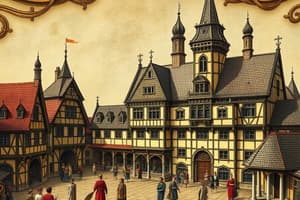Podcast
Questions and Answers
What does feudalism in the Middle Ages resemble?
What does feudalism in the Middle Ages resemble?
a pyramid
The invasions by Vikings, Magyars, and _____ caused widespread disorder and suffering.
The invasions by Vikings, Magyars, and _____ caused widespread disorder and suffering.
Muslims
The worst years of the invaders' attacks spanned roughly 850 to _____.
The worst years of the invaders' attacks spanned roughly 850 to _____.
950
The system of governing and landholding, called ___________, had emerged in Europe.
The system of governing and landholding, called ___________, had emerged in Europe.
The _______ system was based on rights and obligations.
The _______ system was based on rights and obligations.
What was the structure of feudal society likened to?
What was the structure of feudal society likened to?
_____ was a landowner.
_____ was a landowner.
A lord granted land called a _____ to a vassal.
A lord granted land called a _____ to a vassal.
The less powerful military men (the knights) were called ______.
The less powerful military men (the knights) were called ______.
______ were mounted horsemen who pledged to defend their lords' lands in exchange for fiefs.
______ were mounted horsemen who pledged to defend their lords' lands in exchange for fiefs.
In the feudal system, ______ determined a person's prestige and power.
In the feudal system, ______ determined a person's prestige and power.
In Europe in the Middle Ages, the vast majority of people were ______.
In Europe in the Middle Ages, the vast majority of people were ______.
Most peasants were ______ who could not lawfully leave the place where they were born.
Most peasants were ______ who could not lawfully leave the place where they were born.
The ______ was the lord's estate.
The ______ was the lord's estate.
What was the function of the village church?
What was the function of the village church?
Everyone owed the village priest a _____, or church tax.
Everyone owed the village priest a _____, or church tax.
Peasants were free to move from manor to manor.
Peasants were free to move from manor to manor.
Explain why the Catholic Church was so important to the lives of the people of Europe.
Explain why the Catholic Church was so important to the lives of the people of Europe.
How did popes in the 11th century use excommunication as a political tool?
How did popes in the 11th century use excommunication as a political tool?
What was the Concordat of Worms?
What was the Concordat of Worms?
Flashcards are hidden until you start studying
Study Notes
Feudalism Overview
- Feudalism in the Middle Ages operated like a pyramid structure with authority flowing from the king at the top.
- Based on the exchange of land for loyalty and service, this system required allegiance to both the king and local lords.
Causes of Feudalism
- Invasions by Vikings, Magyars, and Muslims created disorder throughout Western Europe, leading people to seek security from local leaders rather than central rulers.
The Feudal Pyramid
- The king at the apex governed land and held power over nobles and bishops, followed by knights who offered military service.
- At the base were peasants, including serfs who worked the land but had limited freedoms.
Roles and Terms
- Lord: A landowner granting land (fiefs) to vassals in return for loyalty.
- Vassal: A lesser noble or knight receiving land from a lord and providing military service.
- Knights: Mounted warriors who defended their lords’ lands in exchange for fiefs.
- Peasants: Majority of the population, with most being serfs bound to the land.
Structure of the Manor
- The manor was the lord's estate, serving as the economic unit during the Middle Ages, providing housing, farmland, and protection to serfs.
- Serfs worked the land in exchange for these provisions, shared labor duties, and paid a tithe (10% of income) to the village priest.
Importance of the Church
- The Church emerged as a powerful entity amid feudal fragmentation, influencing all social classes and political structures.
- It provided spiritual authority and communal bonds through shared beliefs and practices.
Church Organization
- Following a hierarchy, the Pope was the head with bishops supervising priests; local priests were the main contact for the populace.
- All Christians were subject to canon law, which dictated various aspects of life and conduct.
Excommunication and Political Power
- Excommunication served as a political tool, banning individuals from the Church and threatening their salvation, often used to control kings.
- The threat of interdict (suspension of sacraments) further reinforced the Church's influence over political rulers.
Lay Investiture Conflict
- Disputes arose over lay investiture, where kings appointed church officials, leading to power struggles between the Church and monarchs.
- The Concordat of Worms resolved this by stating the Church could appoint bishops, but emperors had veto power.
Knighthood and Status
- Knighthood was a three-stage process involving apprenticeship under a knight, beginning at age 7, progressing to squire at 14, and finally becoming a knight at 21.
- Status in the feudal system dictated individuals' power, roles, and societal respect.
Social Dynamics
- Differences existed between serfs (who were bound to land) and free peasants (who could move freely).
- A shared cultural and religious framework provided stability within the turbulent feudal society.
Summary
- The Catholic Church not only influenced spiritual beliefs but also acted as a unifying force, establishing a sense of community and shared identity among medieval Europeans.
Studying That Suits You
Use AI to generate personalized quizzes and flashcards to suit your learning preferences.



